安徽省黄山市小升初英语专题复习(语法专练):一般将来时
小升初英语一般将来时练习题20题带答案

小升初英语一般将来时练习题20题带答案1. My mother ______ make a big dinner for us this evening.A. willB. is going toC. madeD. makes答案解析:B。
本题考查一般将来时的用法。
根据句中的this evening可知是将来的时间,一般将来时的结构有will+动词原形和be going to+动词原形。
这里表示妈妈打算做一顿丰盛的晚餐,be going to更强调有计划、打算做某事,而will更侧重于临时的决定。
A选项will单独使用缺少动词原形;C选项made是一般过去时,不符合句子的时态;D选项makes是一般现在时,也不符合句子的将来时态。
2. There ______ a football match in our school next week.A. will beB. isC. wasD. are答案解析:A。
此句中next week是表示将来的时间状语。
一般将来时可以用will+动词原形的结构,这里是there be句型的一般将来时,即there will be,表示“将会有”。
B选项is是一般现在时;C选项was是一般过去时;D选项are 是一般现在时且be动词形式错误,因为主语是单数a football match。
3. I ______ visit my grandparents this weekend.A. am going toB. go toC. went toD. have gone to答案解析:A。
根据this weekend可知是将来的时间。
一般将来时的结构be going to+动词原形表示计划、打算做某事。
A选项符合一般将来时;B选项go to 是一般现在时;C选项went to是一般过去时;D选项have gone to是现在完成时,都不符合句子的时态要求。
4. He ______ study harder for the English exam next month.A. willB. is going toC. won'tD. don't答案解析:A或B。
一般将来时-小升初英语语法专项训练(通用,含解析)

一般将来时-小升初英语语法专项训练学校:___________姓名:___________班级:___________考号:___________一、单选题1.We _______ have a picnic tomorrow. ()A.are going to B.will going C.is going to2.It is going to _______ this afternoon. ()A.snowing B.snow C.be snow3.It’s ___________ to rain soon.()A.go B.goes C.going4.Joe is going ________ a robot. ()A.buy B.to buy C.buys5.My Chinese teacher will _______ classes for us tomorrow morning. ()A.has B.had C.have6.Students will ________ a lot of plants in the garden. ()A.grew B.grow C.grows7.—Will you go to the park? ()—No, I ________.A.don't B.will C.won't8.We are going __________ travel. ()A.for B.to C.at9.We are ________ have a picnic. ()A.going to B.go to C.go10.It's going to rain _______. ()A.now B.soon C.just11.Mother _______ some books for me next week. ()A.buy B.buys C.is buying D.is going to buy12.There _________ a butterfly museum in the town in the future. ()A.are B.is C.will be 13.—What will you do for your father? ()—________A.He'll swim.B.I played chess with him.C.I'll give him a present. 14.Tom's parents always say, “My son ________ be an artist.” ()A.does B.will C.have15.On Monday I will ________. ()A.going shopping B.goes shopping C.go shopping二、用单词正确形式填空16.Are they going to ________ (clean) their classroom?17.They _____ (sing) next Children’s Day.18.Amy _____ (have) a busy weekend tomorrow.19.It will ________ (cloud) in Beijing tomorrow.三、看图完成句子20.Ben is going to w_____ TV.四、对划线部分提问21.They will have a picnic in the park. (对划线部分提问)________________________________________22.They will make a big cake tomorrow. (对划线部分提问)________________________________________五、同义句转换23.My friends will paint pictures in the park. (改同义句)My friends ________ ________ to paint pictures in the park.六、改写句子24.They are going to have a party next week. (变为一般疑问句)________________________________________25.I’ll go and join them. (改为否定句)___________________26.Nancy is going to go camping. (改为否定句)___________________七、写出问答句27.What will you do on your birthday? (根据实际情况回答问题) ____________________八、连词成句28.tomorrow, will, windy, it, be, (.)_______________________________29.are, we, when, going, eat, to (?)_______________________________30.kite, tomorrow, you, your, will, take (?)_____________________________九、仿写句子看表格,参考所给的例句说一说Tom的周末计划,并仿写句子。
小升初语法辨析一般现在时一般过去时一般将来时(讲义)人教PEP版英语六年级下册

小升初英语语法辨析:一般现在时、一般过去时、一般将来时&专项模拟练习一、一般现在时1.定义:表示经常发生的动作、存在的状态或普遍真理。
2.时间标志词:often(经常)、usually(通常)、always(总是)、sometimes(有时)、every day/week/month/year(每天/ 周/ 月/ 年)等。
3.结构:1.主语(非第三人称单数)+ 动词原形。
例如:You play basketball afterschool.(你放学后打篮球。
)2.主语(第三人称单数)+ 动词的第三人称单数形式。
例如:He playsbasketball after school.(他放学后打篮球。
)4.用法:1.表示经常性或习惯性的动作。
如:I go to school by bike every day.(我每天骑自行车去上学。
)2.表示现在的状态或特征。
如:She is tall and thin.(她又高又瘦。
)3.表示客观事实或普遍真理。
如:The earth moves around the sun.(地球绕着太阳转。
)二、一般过去时1.定义:表示过去某个时间发生的动作或存在的状态。
2.时间标志词:yesterday(昨天)、last week/month/year(上周/ 上个月/ 去年)、ago(……以前)、in + 过去的年份等。
3.结构:主语+ 动词的过去式。
例如:You played basketball yesterday.(你昨天打了篮球。
)4.用法:1.表示过去某个时间发生的动作。
如:I went to the park last Sunday.(我上周日去了公园。
)2.表示过去存在的状态。
如:He was happy yesterday.(他昨天很开心。
)三、一般将来时1.定义:表示将来某个时间要发生的动作或存在的状态。
2.时间标志词:tomorrow(明天)、next week/month/year(下周/ 下个月/ 明年)、in the future(在未来)等。
小升初英语一般将来时be going to与will用法练习题20题(带答案)
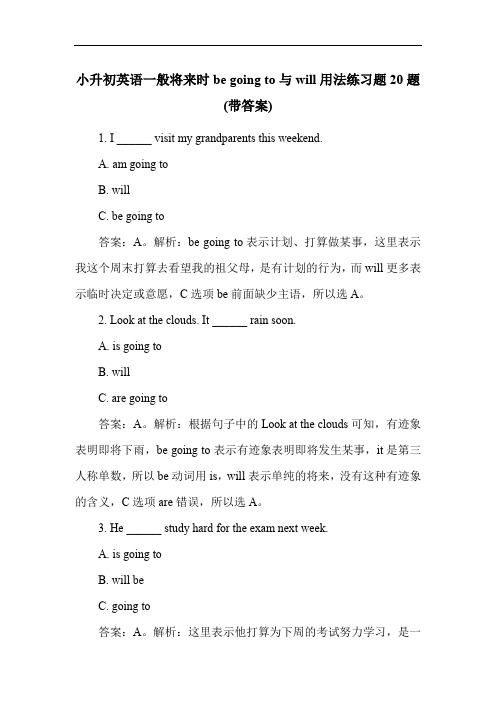
小升初英语一般将来时be going to与will用法练习题20题(带答案)1. I ______ visit my grandparents this weekend.A. am going toB. willC. be going to答案:A。
解析:be going to表示计划、打算做某事,这里表示我这个周末打算去看望我的祖父母,是有计划的行为,而will更多表示临时决定或意愿,C选项be前面缺少主语,所以选A。
2. Look at the clouds. It ______ rain soon.A. is going toB. willC. are going to答案:A。
解析:根据句子中的Look at the clouds可知,有迹象表明即将下雨,be going to表示有迹象表明即将发生某事,it是第三人称单数,所以be动词用is,will表示单纯的将来,没有这种有迹象的含义,C选项are错误,所以选A。
3. He ______ study hard for the exam next week.A. is going toB. will beC. going to答案:A。
解析:这里表示他打算为下周的考试努力学习,是一种计划,be going to可以表示计划,B选项will be后面缺少动词原形,C选项缺少be动词,所以选A。
4. We ______ have a party tonight.A. are going toB. willC. is going to答案:A。
解析:我们今晚打算举办一个派对,这是一种计划,we是复数,be动词用are,be going to表示计划,will更多表示临时决定,所以选A。
5. She ______ be a doctor when she grows up.A. willB. is going toC. are going to答案:A。
小学英语小升初专题复习-一般将来时与现在进行时课件

表示时间的状语,有时没有表示
Shall we go now?
时间的状语,这时要从意思上判 I'm going to meet him at 7:00.
断是否指未来的动作或情况。
温馨提示:(1)在以第一人称I或we作主语的问句中,一般使用助动词 Shall,这时或是征求对方的意见,或是询问情况。(2) “be going to+动 词原形”表示按计划、打算要做的事或主观判断有可能发生的事情。
单项选择。 ( )1. Look! Your cat ________ the tree. A. is climbing B. is climb C. climb
( )2. —What are you doing?—I'm ________ to my friend. A. write B. writing C. to write
小升初专题复习一般将来时与现在进行时
一般将来时的构成及用法
构成
例句
肯定句:主语+be going to+
动词原形(+其他).
I'm going to read a book.
be going 否定句:主语+be not going to I'm not going to read a
to句型 +动词原形(+其他).
构成
例句
肯定句:主语+am/is/are+动词
-ing(+其他).
否定句:主语+am not/isn't/aren't+ I am watching TV now.
动词-ing(+其他). 一般疑问句:Am/Is/Are+主语+动
I am not watching TV now. Are you watching TV now?
小升初语法专题复习-一般将来时态(讲义)-人教PEP版英语六年级下册
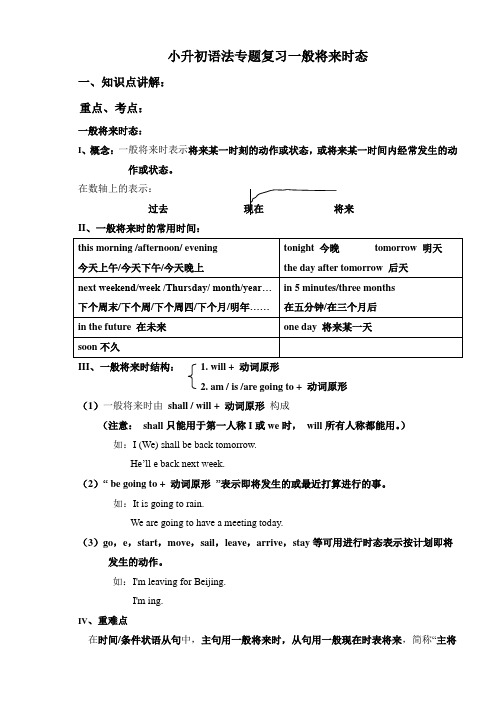
小升初语法专题复习一般将来时态一、知识点讲解:重点、考点:一般将来时态:I 、概念:一般将来时表示将来某一时刻的动作或状态,或将来某一时间内经常发生的动作或状态。
在数轴上的表示:过去现在 将来II 、一般将来时的常用时间:III 、一般将来时结构: 1. will + 动词原形2. am / is /are going to + 动词原形(1)一般将来时由 shall / will + 动词原形 构成(注意: shall 只能用于第一人称I 或we 时, will 所有人称都能用。
) 如:I (We) shall be back tomorrow.He’ll e back next week.(2)“ be going to + 动词原形 ”表示即将发生的或最近打算进行的事。
如:It is going to rain.We are going to have a meeting today.(3)go ,e ,start ,move ,sail ,leave ,arrive ,stay 等可用进行时态表示按计划即将发生的动作。
如:I'm leaving for Beijing.I'm ing.IV 、重难点在时间/条件状语从句中,主句用一般将来时,从句用一般现在时表将来,简称“主将从现”;常见的从句引导词为:when、if 、as soon as 等。
如:If it ________( not rain) tomorrow , we ________(go) to the park.I ________(be) a doctor when I ________(grow) up.I ________ (call) you as soon as he ________(e) back.V、一般将来时态与句型(**)(1)变为否定句:在be动词(am, is, are)后加not,或情态动词will后加not成won’t。
小升初英语一般将来时练习题20题(带答案)

小升初英语一般将来时练习题20题(带答案)1. My sister ______ a new bike next week.A. buyB. will buyC. buysD. bought答案解析:B。
本题考查一般将来时的用法。
一般将来时表示将要发生的动作或存在的状态,其结构为will+动词原形或者be going to+动词原形。
句中有next week(下周)这个表示将来的时间状语,所以要用一般将来时,A选项是动词原形,C选项是一般现在时的第三人称单数形式,D选项是一般过去时,均不符合题意,只有B选项will buy是正确的。
2. There ______ a football match this Sunday.A. isB. will beC. wasD. are答案解析:B。
根据句中的this Sunday(这个周日)可知是将来的时间,这里考查的是there be句型的一般将来时,其结构是there will be或者there is/are going to be,A选项是一般现在时的there be句型,C选项是一般过去时,D选项是一般现在时复数形式的there be 句型,都不符合,所以选B。
3. -What ______ you ______ tomorrow?-I ______ visit my grandparents.A. are; do; willB. do; do; willC. will; do; willD. are; going; am答案解析:C。
第一个空根据tomorrow((明天)可知是问将来的动作,特殊疑问句中一般将来时的结构是will+主语+动词原形或者be going to+动词原形,这里用will;第二个空在will后面要用动词原形do;第三个空回答也是将来的动作,用will+动词原形,A选项第一个空are和do不能搭配,B选项第一个空do和第二个空do搭配错误,D选项第一个空are going后面缺少to,所以C正确。
小学英语小升初语法专项练习:一般将来时【含答案】

(read) books about China, too. There________ (be) lots of delicious food and beautiful places in china. I
want________ (go) to China. So last year I ________ (go) to China and ________ (visit) many beautiful
A. am
B. be
C. is
6.I think life will ______.
A. better
B. be better
C. good
7.There will ______air and clean water on Mars.
A. be fresh
B. fresh
C. is fresh
8.She will ______ to the library.
—Yes, he will.
A. Does
B. Is
C. Will
二、判断题。
23.David is going to buy his favourite comic book.
24.I will be a doctor. (判断语句是否正确)
25.Will you a math teacher? (判断语句是否正确)
34.Jing ________( go to ) the Great Wall tomorrow.
35.My friend ________ the play yesterday. I ________ it tomorrow. (see)
36.They ________(plant) trees tomorrow.
小升初英语一般将来时运用练习题30题(带答案)

小升初英语一般将来时运用练习题30题(带答案)1. My sister ______ a picnic this Sunday.A. will haveB. hasC. hadD. is having答案:A。
解析:一般将来时表示将来某个时间要发生的动作或存在的状态。
其结构为will+动词原形或者be going to+动词原形。
在这个句子中,this Sunday表示这个周日,是将来的时间,所以要用一般将来时。
选项A是will+动词原形,符合一般将来时的结构。
选项B是一般现在时,选项C是一般过去时,选项D是现在进行时,都不符合句子语境。
2. We ______ to the zoo tomorrow.A. goB. are goingC. wentD. have gone答案:B。
解析:根据tomorrow可知是将来的时间,要用一般将来时。
be going to+动词原形也可以表示将来时,这里we作主语,be 动词用are,所以选项B正确。
选项A是一般现在时,选项C是一般过去时,选项D是现在完成时,都不符合句子要求。
3. He ______ his homework after school.A. will doB. doesC. didD. is doing答案:A。
解析:after school是放学后,还没有发生,是将来的时间。
一般将来时结构为will+动词原形或者be going to+动词原形,这里用will+动词原形表示将来做某事,选项A正确。
选项B是一般现在时,选项C是一般过去时,选项D是现在进行时,不符合句子表达的将来的意思。
4. They ______ a football match next week.A. will haveB. hadC. haveD. are having答案:A。
解析:next week表示下周,是将来的时间。
一般将来时结构为will+动词原形或者be going to+动词原形,这里will+动词原形表示将要进行的动作,选项A正确。
小学英语小升初一般将来时专题训练-时态专项练习:一般将来时50题 11页 含错题分析答案
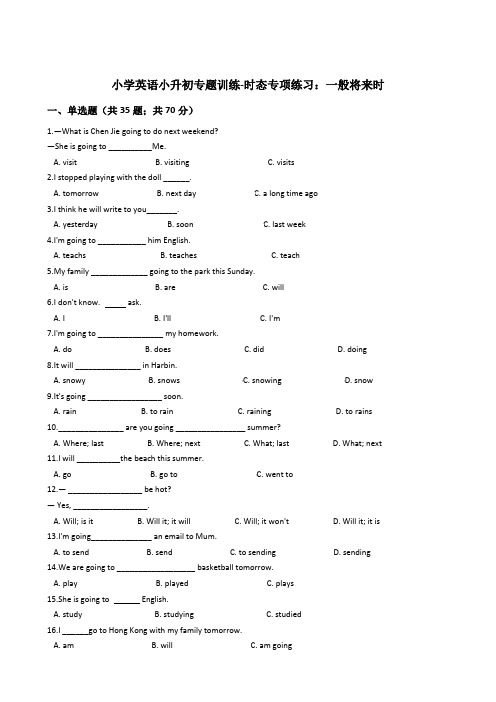
小学英语小升初专题训练-时态专项练习:一般将来时一、单选题(共35题;共70分)1.—What is Chen Jie going to do next weekend?—She is going to __________Me.A. visitB. visitingC. visits2.I stopped playing with the doll ______.A. tomorrowB. next dayC. a long time ago3.I think he will write to you_______.A. yesterdayB. soonC. last week4.I'm going to ___________ him English.A. teachsB. teachesC. teach5.My family _____________ going to the park this Sunday.A. isB. areC. will6.I don't know. ask.A. IB. I'llC. I'm7.I'm going to _______________ my homework.A. doB. doesC. didD. doing8.It will _______________ in Harbin.A. snowyB. snowsC. snowingD. snow9.It's going _________________ soon.A. rainB. to rainC. rainingD. to rains10._______________ are you going ________________ summer?A. Where; lastB. Where; nextC. What; lastD. What; next11.I will __________the beach this summer.A. goB. go toC. went to12.— _________________ be hot?— Yes, _________________.A. Will; is itB. Will it; it willC. Will; it won'tD. Will it; it is13.I'm going______________ an email to Mum.A. to sendB. sendC. to sendingD. sending14.We are going to __________________ basketball tomorrow.A. playB. playedC. plays15.She is going to English.A. studyB. studyingC. studied16.I ______go to Hong Kong with my family tomorrow.A. amB. willC. am going17.Wang Bing is going to ______some fruit.A. bringB. bringsC. brought18.She is going to _____ in the river.A. swimB. swamC. swimsD. swimming19.We're going to ______________ a baseball game.A. haveB. hadC. has20.It will in Sanya.A. warmB. sunC. be warm21.The seeds are bad and will never ____________________.A. sproutsB. sproutingC. sprout22.I'm going to________art lesson.A. having aB. have anC. have a23.—When are you going to Beijing?—.A. Last weekendB. This weekendC. Yesterday24.One day I _______ visit the moon.A. amB. /C. am going to25.It will ___________ in Xi'an tomorrow.A. windyB. be windyC. be snow26.We're going to __________Chinese.A. speakingB. speakC. speaksD. making27.There _________________ a strong wind along the sea the day after tomorrow.A. isB. areC. will be28.What John do with you this afternoon?A. isB. doesC. will29.We are going to ______________ our primary school.A. leaveB. leavesC. leaving30.I'll _______ it forever.A. keepB. keepsC. kept31.I will _____________ you.A. missingB. missesC. miss32.We _______ have a baseball team.A. be going toB. are going toC. is going to33.It is going to be _________.A. sunB. sunnyC. snow34.We _______ have a picnic this Sunday.A. am going toB. is going toC. are going to35.Look! It's going to __________ soon.A. rainyB. rainC. raining二、选词填空(词汇运用)(共4题;共4分)36.Someday she will________ (visit/visits) America with her family.37.It will ________ (snow/ snowy) in Beijing.38.We ________ (are going to have/ have) a farewell party next Saturday afternoon.39.She will ________ (meet/ meeting) her friends in the park.三、语法填空(共11题;共11分)40.They________ (visit) their grandparents next weekend.41.I am________ (go) to the park.42.What will you ________ (do) tomorrow?43.He will ________(is) a farmer.44.I will________(remember) you forever.45.We________(buy) some delicious food tomorrow. What about you?46.They ________(come)to the airport to meet their friend, Tom next Monday.47.Nancy________ (take) part in a sports meeting next week.48.Kitty is arriving on Sunday, the ________ (five) of January.49.Dong Hao ________ (write) letters to his friends tomorrow.50.We're going to________some pictures in Renmin Park(draw).答案解析部分一、单选题1.【答案】A【考点】一般将来时,动词原形【解析】【分析】句意:—陈杰下周末打算做什么?—她打算来……我。
小升初英语一般将来时一般疑问句练习题40题带答案解析

小升初英语一般将来时一般疑问句练习题40题带答案解析1.Will you go to the park tomorrow?Yes, I will.No, I won't.答案解析:本题考查一般将来时的一般疑问句。
一般将来时的一般疑问句结构为“Will + 主语+ 动词原形+ 其他?”。
在这个句子中,“go to the park”是动词原形短语。
回答用“Yes, I will.”表示肯定,“No,I won't.”表示否定。
2.Will he play football this weekend?Yes, he will.No, he won't.答案解析:同样是一般将来时的一般疑问句,“play football”是动词原形短语。
根据主语“he”来确定回答。
3.Will they go swimming next week?Yes, they will.No, they won't.答案解析:“go swimming”是动词原形短语,“they”表示复数主语,回答根据实际情况。
4.Will you visit your grandparents on Sunday?Yes, I will.No, I won't.答案解析:“visit your grandparents”是动词原形短语,一般疑问句询问周日是否会去看望祖父母。
5.Will she do her homework tonight?Yes, she will.No, she won't.答案解析:“do her homework”是动词原形短语,根据主语“she”来回答。
6.Will we have a picnic next month?Yes, we will.No, we won't.答案解析:“have a picnic”是动词原形短语,询问下个月是否会去野餐。
7.Will you watch TV after school?Yes, I will.No, I won't.答案解析:“watch TV”是动词原形短语,一般疑问句询问放学后是否会看电视。
2025年小升初英语语法专项复习之一般将来时复习PPT课件

以用will。 如: From now on, we shall go there every Friday.
从现在起,我们将每周五去那儿。
Ann will go to the park this morning.安打算今天早上去公园。
这周六她打算去跳舞吗?
Are you going to play football this afternoon?
你今天下午打算去踢足球吗? Are they going to ride a bike next Tuesday?
他们打算下星期二去踩自行车吗?
(2)“will/shall+ 动词原形”结构 ①肯定句:主语 + shall/will+ 动词原形(+其他)
下周我们不上课。 She is not going to go shopping tomorrow. 她明天不打算去购物。 I’m not going to visit my friend next Saturday. 下周六我不打算去探望我的朋友。
③特殊疑问句: 疑问词( What/Where/How/When...) +be (am/is/are)+ 主 语 +going to+ 动词原形 (+其他)?
明年我将要去北京工作。 My brother is going to go fishing next Sunday. 我弟弟打算下周日去钓鱼。
②否定句: 主语 +be (am,is,are )+not going to+动词原形(+其他)
小升初英语一般将来时一般疑问句练习题50题

小升初英语一般将来时一般疑问句练习题50题1. Will you go to the park this weekend?A. Yes, I willB. No, I don'tC. Yes, I doD. No, I won't答案:A或D。
解析:这是一个一般将来时的一般疑问句。
一般将来时的一般疑问句结构是“Will + 主语+动词原形+其他”。
回答时用“Yes, 主语+will”或者“No, 主语+won't”。
选项A表示肯定回答,我将会去公园;选项D表示否定回答,我将不会去公园。
选项B和C中“don't”是一般现在时的助动词,不符合一般将来时的回答要求。
2. Will your family take a trip next month?A. Yes, they willB. No, they notC. Yes, they areD. No, they don't答案:A。
解析:对于一般将来时“Will + 主语+动词原形+其他”的一般疑问句,肯定回答是“Yes, 主语+will”。
这里主语是“your family”,回答时用“they”指代,所以是“Yes, they will”。
选项B中“not”用法错误;选项C中“are”是一般现在时be动词形式,不符合一般将来时回答;选项D中“don't”是一般现在时助动词,也不符合要求。
3. Will he play football tomorrow?A. Yes, he willB. No, he can'tC. Yes, he isD. No, he doesn't答案:A。
解析:一般将来时的一般疑问句的回答形式,肯定回答为“Yes, 主语+will”。
本题中主语是“he”,所以肯定回答是“Yes, he will”。
选项B中“can't”是“can”的否定形式,与一般将来时无关;选项C中“is”是一般现在时be动词形式;选项D中“doesn't”是一般现在时助动词形式,都不符合要求。
小升初英语一般将来时练习题20题含答案解析
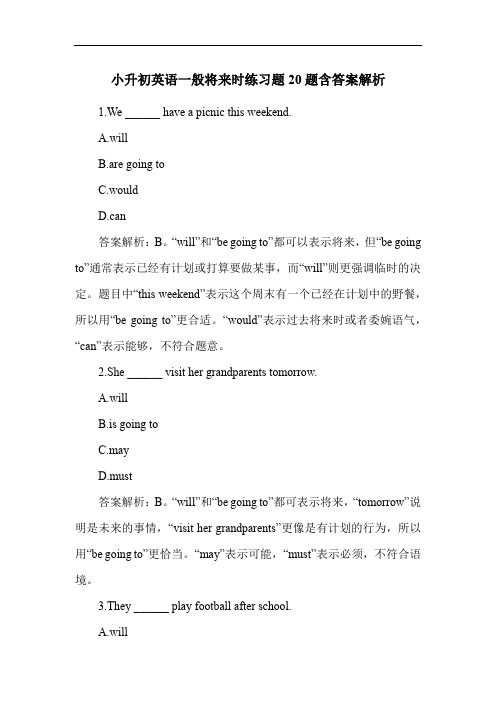
小升初英语一般将来时练习题20题含答案解析1.We ______ have a picnic this weekend.A.willB.are going toC.wouldD.can答案解析:B。
“will”和“be going to”都可以表示将来,但“be going to”通常表示已经有计划或打算要做某事,而“will”则更强调临时的决定。
题目中“this weekend”表示这个周末有一个已经在计划中的野餐,所以用“be going to”更合适。
“would”表示过去将来时或者委婉语气,“can”表示能够,不符合题意。
2.She ______ visit her grandparents tomorrow.A.willB.is going toC.mayD.must答案解析:B。
“will”和“be going to”都可表示将来,“tomorrow”说明是未来的事情,“visit her grandparents”更像是有计划的行为,所以用“be going to”更恰当。
“may”表示可能,“must”表示必须,不符合语境。
3.They ______ play football after school.A.willB.are going toC.shouldD.ought to答案解析:B。
有“after school”这个时间提示,说明有一定的计划安排,用“be going to”更合适。
“should”和“ought to”表示应该,不符合题意。
4.I ______ buy a new book next week.A.willB.am going toC.mightD.could答案解析:B。
“next week”表明是将来的时间,“buy a new book”更像是有打算的行为,所以用“be going to”更好。
“might”和“could”表示可能,语气较委婉,不符合语境。
小升初英语一般将来时练习题20题答案解析版

小升初英语一般将来时练习题20题答案解析版1. My mother ______ me a new bike for my birthday.A. will buyB. buysC. boughtD. is buying答案解析:A。
本题考查一般将来时。
根据句子“for my birthday (为我的生日)”,这是一个将来的事件。
一般将来时的结构有“will+动词原形”和“be going to+动词原形”。
选项A“will buy”符合一般将来时的结构,表示将要做某事;选项B“buys”是一般现在时的第三人称单数形式,用于表示经常或习惯性的动作,不符合语境;选项C“bought”是一般过去时,用于表示过去发生的动作,与句子的将来含义不符;选项D“is buying”是现在进行时,表示正在进行的动作,也不符合题意。
2. We ______ to the park this Sunday.A. goB. will goC. wentD. are going答案解析:B或D。
本题考查一般将来时。
“this Sunday((这个周日)”是将来的时间。
一般将来时可以用“will+动词原形”或者“be going to+动词原形”来表示。
选项B“will go”是一般将来时的一种结构,表示将要去公园;选项D“are going”这里“are going to”省略了“to”,也是表示计划、打算做某事,即将去公园,同样符合题意。
选项A“go”是一般现在时,不能表示将来的动作;选项C“went”是一般过去时,不符合句子的将来时间。
3. There ______ a big party in our school next week.A. isB. will beC. wasD. has been答案解析:B。
本题考查一般将来时的“there be”句型。
“next week (下周)”表明是将来的时间。
一般将来时的“there be”句型结构为“there will be”或者“there is/are going to be”。
小升初语法专项复习:一般将来时课件(课件)-2023-2024学年通用版英语

D. are back to you
—I don’t know if Mr.Li to the party this evening.
—I think he will come if he free.
A. Will come; is B.will come; will be es; is es; will be
否定直接加not 疑问要把will提前
They will come here tomorrow.
They won’t come here tomorrow. Will they come here tomorrow?
will没有单复数
I’m going to swim across the English Channel.
in two years
很快下个明天和未来 In+年份以后见
8always
3two
days ago
9in two
years
一般 过去时
一般 现在时
5next
week
一般 将来时
个词走遍一般将来
02
will
be going to
. Robots will help us drive in the future. The RMBwwillill become the world's most important currency in 2050. .China is going to establish a base on the moon in ten years We shall make great progress in the future.
to
a new flat next week.
小升初英语一般将来时练习题30题(带答案)

小升初英语一般将来时练习题30题(带答案)1. There ____ a football match tomorrow.A. will haveB. is going to beC. hasD. is having答案解析:B。
一般将来时表示将来某个时间要发生的动作或存在的状态。
在这个句子中,“tomorrow”表明是将来的时间,这里考查“there be”句型的一般将来时结构,有两种形式“there will be”和“there is/are going to be”。
A选项“will have”是错误用法,因为“there be”本身表示“有”,不能再用“have”;C选项“has”是一般现在时的第三人称单数形式,时态不符;D选项“is having”是现在进行时,不符合句子的将来时态要求。
2. I ____ my grandparents this weekend.A. visitB. am visitingC. will visitD. visited答案解析:C。
“this weekend”表示这个周末,是将来的时间。
一般将来时结构为“will+动词原形”或者“be going to+动词原形”。
A选项“visit”是一般现在时,不符合句子的将来语境;B选项“am visiting”是现在进行时表将来,通常是表示计划好即将要做的事情,这里用“willvisit”更合适,表示一种意愿;D选项“visited”是一般过去时,时态错误。
3. He ____ a new bike next month.A. buysB. is buyingC. will buyD. bought答案解析:C。
“next month”是下个月,是将来的时间标志。
A选项“buys”是一般现在时,用于表示经常或习惯性的动作,不符合这里的将来时态;B选项“is buying”是现在进行时表将来,通常是一些计划好很快就要进行的动作,这里用“will buy”更强调一种将来的打算;D选项“bought”是一般过去时,时态错误。
(小升初)英语语法复习课件-一般将来时全梳理+同步练习+通用版

2.一般将来时的标志词
接着让我们来看看这几个句子^^
-I will be the head teacher in the future. -我将来会成为校长。
-I will go to school tomorrow. 我明天要去学校。
-He will go shopping this afternoon. -他今天下午要去逛街。
让我们来看两个句子^^
-I will play football tomorrow. -我明天将要踢足球。
-I will be 13 years old next year. -我明年就要13岁了。
在用法上,我们用will+动词原形表示将要发生的动作; 用will+be+名词/形容词形成系表结构,表示主语将来 的身份,或所处的状态。当然还可以用will+be+介词 短语。让我们接下一页看几个例句吧!
lesson next Tuesday afternoon. 3. It will be fine there next Monday. It _w__o_n_’_t _ be
will be+名词/形容词/介词短语
-I will be 13 years old next year.
-我明年就要13岁了。 加名词
-Schools will be different.
-学校会变得不同。
加形容词
-Schools will be under the sea, on high mountains and
牛刀小试
1. She_______ buy some books tomorrow. ( C )
A.want to B.is going C.will
小升初英语一般将来时练习题20题含答案解析
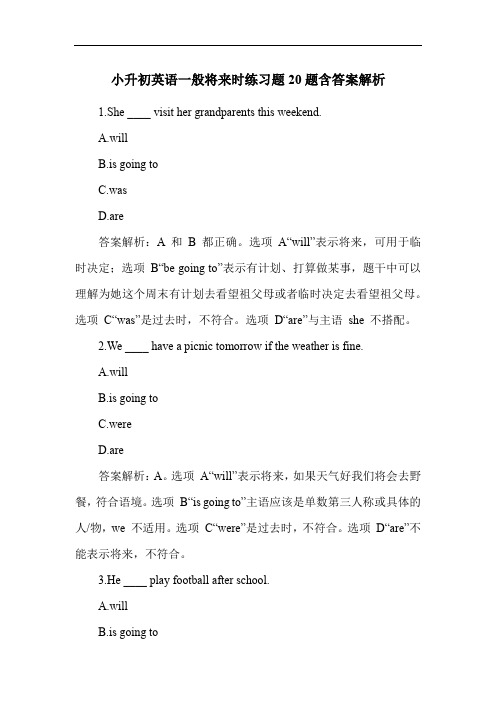
小升初英语一般将来时练习题20题含答案解析1.She ____ visit her grandparents this weekend.A.willB.is going toC.wasD.are答案解析:A 和 B 都正确。
选项A“will”表示将来,可用于临时决定;选项B“be going to”表示有计划、打算做某事,题干中可以理解为她这个周末有计划去看望祖父母或者临时决定去看望祖父母。
选项C“was”是过去时,不符合。
选项D“are”与主语she 不搭配。
2.We ____ have a picnic tomorrow if the weather is fine.A.willB.is going toC.wereD.are答案解析:A。
选项A“will”表示将来,如果天气好我们将会去野餐,符合语境。
选项B“is going to”主语应该是单数第三人称或具体的人/物,we 不适用。
选项C“were”是过去时,不符合。
选项D“are”不能表示将来,不符合。
3.He ____ play football after school.A.willB.is going toC.playedD.plays答案解析:A 或B。
选项A 和B 都可以表示将来,他放学后将会去踢足球,可以理解为有计划或者临时决定。
选项C“played”是过去时,不符合。
选项D“plays”是一般现在时,不符合。
4.They ____ go to the zoo next Sunday.A.willB.is going toC.wereD.are答案解析:A。
选项A“will”表示将来,他们下周日将会去动物园。
选项B“is going to”主语应该是单数第三人称或具体的人/物,they 不适用。
选项C“were”是过去时,不符合。
选项D“are”不能表示将来,不符合。
5.I ____ read a book tonight.A.willB.is going toC.wasD.are答案解析:A。
- 1、下载文档前请自行甄别文档内容的完整性,平台不提供额外的编辑、内容补充、找答案等附加服务。
- 2、"仅部分预览"的文档,不可在线预览部分如存在完整性等问题,可反馈申请退款(可完整预览的文档不适用该条件!)。
- 3、如文档侵犯您的权益,请联系客服反馈,我们会尽快为您处理(人工客服工作时间:9:00-18:30)。
安徽省黄山市小升初英语专题复习(语法专练):一般将来时姓名:________ 班级:________ 成绩:________小朋友,带上你一段时间的学习成果,一起来做个自我检测吧,相信你一定是最棒的!一、单选题 (共50题;共100分)1. (2分) He can ___________ the room.A . cleanB . cleansC . cleaned2. (2分) May,what does your brother for autumn?A . hasB . have3. (2分) I can't _____.A . waitingB . waitsC . wait4. (2分) That will ________fun.A . /B . beC . is5. (2分) I'm to buy a gift my mother.A . going;toB . going;forC . go;to6. (2分) Robots will ________ everything.A . doB . doesC . did7. (2分)—_____ will you do this holiday ?—I will visit Shanghai.A . WhereB . WhatC . Whose8. (2分)—What will you do tomorrow?—________A . We'll do the housework.B . We'll read our books.9. (2分) We ________ a Christmas card ________ our good friend tomorrow.A . send;forB . write;toC . are going to write;to10. (2分) It will________ in Beijing.A . snowB . snowingC . be snow11. (2分)—Lily ,what will you do ?—_____________ .A . I will listen to music.B . She will play football.C . Yes ,she will.12. (2分) We will ______a big cake.A . makingB . makesC . make13. (2分) I the Great Wall next week.A . visitB . am going to visitC . visits14. (2分) We ________ to the zoo to see the monkeys tomorrow.A . will goB . goesC . went15. (2分) I am going to the moon.A . visitingB . visitsC . visit16. (2分) What ________ Danny do tomorrow?A . doesB . doC . will17. (2分) It will ___ in Harbin .A . snowingB . snowC . snowy18. (2分) (2018五下·盐田期末) Tim a boat in the park tomorrow.A . will rowB . is rowingC . rows19. (2分) He is going to ________basketball.A . playB . playingC . plays20. (2分) I will _____ them.A . takeB . takesC . taking21. (2分) My parents ________ go for a holiday with me next weekend.A . willB . didn'tC . is going to22. (2分) There ___ an English book on the desk.A . amB . areC . is23. (2分) What will happen your friend?A . atB . toC . for24. (2分) We are also________ to start new lessons.A . goesB . goingC . go25. (2分) This ________ a dog.A . isB . areC . am26. (2分) I'm going to study many subjects and learn ________ my new friends ________.A . of,happyB . with,happilyC . for,happily27. (2分) What are you_____to do tomorrow?A . goesB . goC . going28. (2分) We should not on the grass.A . walkingB . to walkC . walk29. (2分)—Does Amy winter?—Yes,she .A . likes isB . like isC . like does30. (2分) How do you ________ the bookshop?A . getB . gets toC . get to31. (2分)—______ are they going to____ tomorrow?—They are going to have a party.A . When;doB . What;goC . What;do32. (2分) He's going to ________ the Great Wall next week.A . visitB . visitsC . visiting33. (2分) (2020六上·北京期中) He said he should _______.A . exercise moreB . wrote a letterC . walked the dog34. (2分)— What are you going to do this afternoon?—A . Yes. Here they are.B . I go to school by bike.C . I'm going to buy a book.35. (2分)— Does your pen pal _____________ football every weekend? — Yes,he does. He likes _____________ sports.A . plays;playingB . play;playingC . plays;plays36. (2分) It's going to________.A . rainingB . rainC . rained37. (2分) Mum will ________ a new bag for me.A . to buyB . buysC . buy38. (2分) There more dinosaurs over there.A . beB . isC . are39. (2分) There were no in my time.A . carB . carsC . a carD . the ear40. (2分) There ________ some shirts and T-shirts on the shelf.A . areB . isC . have41. (2分) All skin colours from melanin.A . comeB . comesC . coming42. (2分) (2019六下·凉州期末) Did you ________ pictures yesterday?A . drawB . drawingC . drew43. (2分) It will be sunny ________ Sunday.A . inB . onC . at44. (2分) So I will play football ________.A . SundayB . yesterday(昨天)C . tomorrow45. (2分) She will play ________ her friends.A . toB . withC . at46. (2分) We will ________ next week.A . go swimB . go swimmingC . go swiming47. (2分) ________ Sam and Jim going to the library this afternoon?A . AmB . IsC . Are48. (2分) We ________ a good time.A . hasB . haveC . having49. (2分) It will ________ all right.A . beB . isC . was50. (2分)— Do you like this gift?— Yes,I like it very .A . muchB . goodC . well参考答案一、单选题 (共50题;共100分)1、答案:略2-1、3-1、4-1、5-1、6-1、7-1、8-1、9-1、10-1、11、答案:略12、答案:略13-1、14-1、15-1、16-1、17-1、18-1、19-1、20-1、21-1、22-1、23、答案:略26-1、27-1、28-1、29-1、30-1、31-1、32、答案:略33-1、34-1、35-1、36、答案:略37-1、38-1、39-1、40、答案:略41-1、42-1、43-1、44-1、45-1、46-1、47-1、50-1、。
